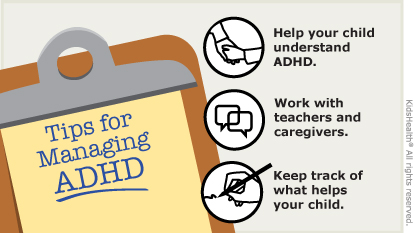Kids with attention deficit hyperactivity disorder (ADHD) can have trouble paying attention. They may also have trouble sitting still, do things without thinking, and have behavior problems. Without treatment, ADHD can lead to low self-esteem, depression, difficult behavior, problems in school, risk-taking behaviors, or family conflict. With the right support from family and health care providers, most kids can learn to manage their ADHD.


Get involved. Learn about ADHD and help your child understand it. Follow your health care provider's recommendations for treatment, therapy, and follow-up visits.
Help your child with medicines. If the health care provider prescribed medicine, help your child take it as directed. A weekly pill organizer can help you keep track of the medicine. Store the medicine in a safe place, preferably locked in a cabinet. Talk to the health care provider before changing or stopping your child's medicine; starting any new treatments; or giving any herbs, vitamins, or supplements.
Follow up. Return for follow-up visits and going to see other specialists (such as a psychiatrist, psychologist, or neurologist) as instructed.
Work with teachers and caregivers. To help your child at school, meet with the teachers and staff to talk about things that may help, such as:
Set a routine. Keep a daily routine so your child knows what to expect. Help them get plenty of exercise and enough sleep. Encourage them to find a sport, hobby, or activity that they enjoy.
Parent gently. Set clear and reasonable goals for your child and reward good behavior (for example, with a sticker chart). Use a calm voice when disciplining your child and never spank or hit them. Focus on your child's strengths when speaking to them about behavior.

Your child:
Also, talk to your health care provider if you have trouble coping with your child's behavior or worry you might hit or hurt your child.

What causes ADHD? Kids with ADHD have differences in their brain activity and brain chemistry compared with other kids. It's not clear what causes these brain differences. Sometimes, ADHD runs in families. ADHD is not caused by too much screen time, bad parenting, or a child's diet.
What are the symptoms of ADHD? Most kids struggle to pay attention, listen to directions, or sit still sometimes. But kids with ADHD struggle more with these types of things. They can show signs in different ways, such as being:
Not all kids with ADHD have all these symptoms. For example, some kids with ADHD are not hyperactive but do have trouble paying attention.
How is ADHD treated? Treatment for ADHD can include: